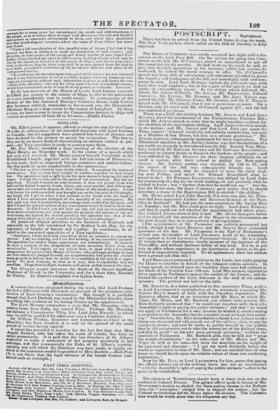There was a little skirmishing between Mr. JERVIS and Lord
Jou sr Ressesi. about the recommittal of the Parliamentary Electors Bill ; which Mr. Jenvis moved, in order that he might introduce a clause for the abolition of the registration-shilling. Lord Jostle refused to accede to the motion ; and Mr. JERVIS said that Lord John (we quote the Times report) "behaved cavalierly and unfairly towards him, not only - as a Member of that House, but also as a private gentleman." Mr. JERVIS, however, subsequently apologized for these expressions. The Ministerial objection to Mr. Jervis's motion was that the abolition of a
tax could riot properly be introduced into the bill. Several Tory Mem-
bers, including Sir EDWARD SUGDEN and Sir EDWARD KNATCHRULL, professed an earnest desire to diminish the burdens of the people ; and were ridiculed by Mr. HARVEY for their claptrap exhibition on so
small a mutter, after their refusal to abolish the Rate-paying clauses. Mr. Jervis's motion was rejected, by 152 to 75; and
the report of the bill was subsequently brought tip. Lord Janis: RUSSELL stated, that he intended to move the third read- ing next Friday; and asked Sir Edward Knatchbull what he meant to do ? Sir EDWARD KNATCHOULL was obliged to Lord John for announcing the day for the third reading—it was precisely what he wished to know; but " further than that be could not say." Just be- fore the House rose, Sir JOHN CAMPBELL gave notice that he should introduce a clause in the Registration Bill to abolish " the shilling."
Mr. Hume asked Lord John Russell, if it were true that Mr. Prim- rose had been appointed Cashier and Receiver- General of the Post- office in Scotland ? He had put the same question to Mr. Spring Rice
on Tuesday ; but Mr. Rice could give no reply. Lord Jolts: RUSSELL said that he could not tell whether the appointment had taken place. But Colonel ANSON avowed that it bad. Mr. HUME then gave notice that he should call the attention of the House to the circumstance on the next Supply day, as it was contrary to all regulations. [The !appointment of Mr. PRIMROSE was publicly announced last week, though Lord JOHN RUSSELL and Mr. Seal so RICE pretended ignorance of the fact. Mr. PRIMROSS is the Earl of ROSERERRY'S second son, tbe brother of Lord DALMENY, Lord of the Admiralty. and nephew to Lord LICHFIELD, Postmaster-General. He is a youth of twenty-four or thereabouts, totally ignorant of the business of the Post-office, and without business habits of any kind. Yet he is put into an office where experience in the description of duties to be per- formed is imperatively required. To all appearance, there has seldom been a grosser job than this.'
• Lord BROUGHAM presented a petition to the Lords, last night, praying the House to interfere in behalf of the Glasgow cotton-spinners. In a long speech, he insisted upon the hardship those men had endured at the hands of the Scottish Law Officers. Lord MELBOURNE objected to these appeals to Parliament against the verdict of the Courts ; and de- fended the conduct of the Lord Advocate in the trial of the cotton- spinners. The petition was laid on the table.
Mr. ROEBUCK, in a letter published in this morning's Times, repli to Lord LANSDOWNE'S contradiction of his statement respecting Mr. SPRING Rice's breach of faith with the Canadian deputation. Mr. ROEBUCK affirms, that at an interview with Mr. Rice, at which Mr. Viger, Mr. Morin, and Mr. Roebuck (no others) were present, Mr. Rice distinctly promised that " he would not interfere with their (the Assembly's) right of paying the public servants;" and that " be would not apply to Parliament for a vete, because he wished to avoid creating a suspicion in the Assembly that he intended to act without their autho- rity." Nevertheless, Mr. Rice immediately ordered Lord Aylmer to take. thirty-one thousand and odd pounds out of the military chest, to pay the salaries in smear; and now he seeks to justify himself by the quibble that he did not promise not to take the money out of the military chest, and that he acted " on his own mere personal authority," without the sanction of Parliament. Mr. Roebuck adds, that he will not " press the weight of testimony" on his side—that of Mr. Morin arid Mr. Viger as well as his own—but rests the assertion on the weight of his own word and character : " I put my word distinctly before the world in opposition to that of Mr. Rice ; and am satisfied that all who know us should decide upon the relative values of these two conflicting testimonies."
Now let Mr. RICE, or Lord LANSDOWNE for Lim, prove that paying the official salaries out of the military chest, was not an interference with the Assembly's right of paying the public servants "—that is the point to be established.


























 Previous page
Previous page